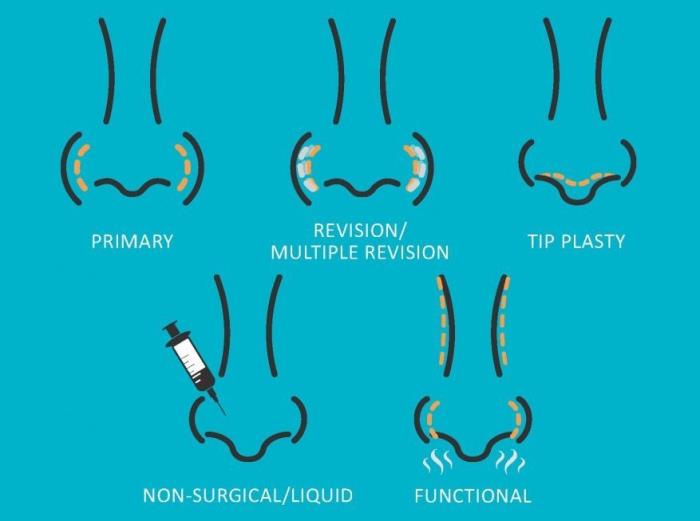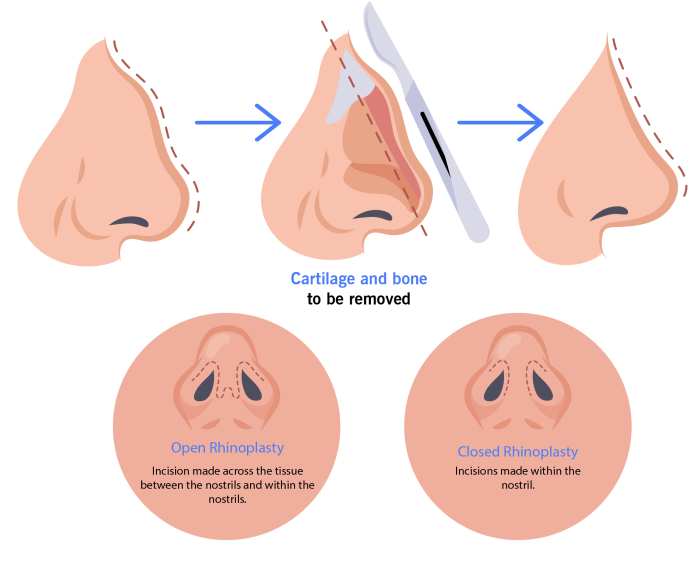Rhinoplasty in India offers patients a blend of advanced medical expertise and cost-effective solutions. Renowned for its skilled surgeons and state-of-the-art facilities, India has become a popular destination for individuals seeking cosmetic nasal surgery. With competitive pricing and high standards of care, rhinoplasty in India is a compelling option for those looking to enhance their appearance while benefiting from a quality experience.
Understanding Rhinoplasty
What is Rhinoplasty and How Does it Work?
Rhinoplasty, commonly known as a nose job, is a surgical procedure aimed at enhancing the appearance and function of the nose. It can address issues such as nasal deformities, breathing difficulties, and aesthetic concerns.
During rhinoplasty, the surgeon reshapes the nasal bones and cartilage to achieve the desired results. The procedure can be performed through open or closed techniques, depending on the complexity of the changes required. Recovery typically involves a period of swelling and bruising, with most patients resuming normal activities within a few weeks.
When is Rhinoplasty Necessary?
Rhinoplasty is necessary when patients have functional issues like breathing difficulties or aesthetic concerns such as disproportional nose size or shape. It can also correct deformities from injury or congenital conditions, enhancing both appearance and nasal function.
Different Types of Rhinoplasty
There are two main types of rhinoplasty : open and closed. Open rhinoplasty involves an external incision across the columella, allowing for more extensive reshaping, while closed rhinoplasty is performed through internal nostril incisions, minimizing visible scarring and reducing recovery time.

The Rhinoplasty Procedure
Pre-Surgery Evaluation Process
The pre-surgery evaluation process for rhinoplasty involves a comprehensive assessment by the surgeon, including a detailed medical history review, physical examination of the nose, and discussions about the patient's aesthetic goals. This may be complemented by imaging studies or photographs to plan the surgical approach and ensure optimal results.
Choosing the Right Type of Rhinoplasty
Choosing the right type of rhinoplasty depends on your specific needs and goals. An open rhinoplasty is ideal for complex cases requiring extensive modification, while a closed rhinoplasty suits less invasive adjustments with minimal external scarring. Consulting with a qualified surgeon will help determine the best approach based on your nasal structure and desired outcomes.
Detailed Surgical Procedure for Rhinoplasty
The detailed surgical procedure for rhinoplasty involves making precise incisions to access and reshape the underlying nasal structures. Depending on the technique, the incisions may be external (open rhinoplasty) or internal (closed rhinoplasty). The surgeon then sculpts the cartilage and bone to achieve the desired shape, with the incisions closed and the nose stabilized using splints or packing.
Post-Surgery Care and Recovery
Post-surgery care for rhinoplasty involves managing swelling and bruising, following a prescribed medication regimen, and avoiding strenuous activities. Patients should adhere to follow-up appointments for monitoring recovery and to ensure optimal healing and results.
Top Hospitals for Rhinoplasty in India
Best hospitals for rhinoplasty in India include Apollo Hospitals in Chennai, Fortis Healthcare in Delhi, and Medanta in Gurgaon. These institutions are renowned for their advanced facilities and experienced surgeons, offering high-quality care for both cosmetic and functional nasal surgeries.
Success Rates and Survival Statistics for Rhinoplasty in India
Success rates for rhinoplasty in India are high, with most patients achieving their desired aesthetic and functional outcomes. Complications are rare, and survival statistics indicate a low risk of serious issues, thanks to advanced surgical techniques and experienced surgeons at leading hospitals.
Best Rhinoplasty Doctors in India
India is home to some of the best rhinoplasty doctors, renowned for their expertise and advanced surgical techniques. Leading specialists include Dr. Brajendra Baser at Akash Nose Clinic, known for his extensive experience in nasal surgeries, and Dr. Siddharth Prakash, who has trained at prestigious institutions like Harvard Medical School.
Legal and ethical considerations for rhinoplasty in India
Legal and ethical considerations for rhinoplasty in India include ensuring that the surgery is performed by a certified and licensed surgeon, and that the facility adheres to established medical standards. Patients should receive clear, informed consent and be fully aware of the risks and benefits before proceeding. Adherence to ethical practices ensures safety and maintains high standards of care.
Cost of Rhinoplasty in India
The cost of rhinoplasty in India typically ranges from ₹50,000 to ₹2,00,000, depending on factors like the complexity of the procedure, the hospital’s location, and the surgeon's expertise. This price is often significantly lower compared to other countries, making India a popular destination for affordable, high-quality nasal surgery.
Explore a detailed breakdown of rhinoplasty cost in India by visiting our in-depth guide rhinoplasty cost in India.
Preparing for Rhinoplasty
Lifestyle Changes Before Rhinoplasty
Before rhinoplasty, it's important to make several lifestyle changes to ensure a smooth surgery and recovery. This includes avoiding smoking and alcohol, as they can affect healing, and discontinuing medications that may increase bleeding risk. Maintaining a healthy diet and staying well-hydrated can also support optimal recovery.

Medications and Treatments Required for Rhinoplasty Patients
Rhinoplasty patients typically require medications such as pain relievers and antibiotics to manage discomfort and prevent infection. Nasal sprays or saline solutions may be recommended to keep the nasal passages moist during recovery. Following the surgeon's instructions on medication and treatment is crucial for optimal healing and minimizing complications.
Importance of Support Systems and Counseling for Rhinoplasty Patients
Support systems and counseling are crucial for rhinoplasty patients to navigate the emotional and physical aspects of recovery. Having a supportive network and access to professional counseling can help manage expectations, reduce anxiety, and ensure a smoother healing process, ultimately contributing to better overall outcomes.
Life After Rhinoplasty
Recovery Process After Rhinoplasty
The recovery process after rhinoplasty typically involves a few days of rest with swelling and bruising peaking within the first week. Patients should avoid strenuous activities and follow post-operative care instructions, including using prescribed medications and attending follow-up appointments. Full results and complete healing can take several months, but most people return to normal activities within a few weeks.
Long-term Care and Monitoring After Rhinoplasty
Long-term care and monitoring after rhinoplasty involve regular follow-up visits to ensure proper healing and assess the final outcomes. Patients should continue to protect their nose from trauma and follow any additional care instructions provided by their surgeon. Adhering to these guidelines helps maintain the results and address any potential complications early.
Potential Risks and Complications of Rhinoplasty
Potential risks and complications of rhinoplasty include infection, excessive bleeding, and adverse reactions to anesthesia. Patients may also experience nasal obstruction, uneven results, or the need for revision surgery. Choosing a skilled surgeon and following post-operative care instructions can minimize these risks and ensure a successful outcome.
Latest Advancements in Rhinoplasty
Minimally Invasive Techniques in Rhinoplasty
Minimally invasive techniques in rhinoplasty, such as closed rhinoplasty, involve internal incisions that reduce visible scarring and promote quicker recovery. These methods focus on precise reshaping with minimal disruption to surrounding tissues, offering a less invasive option for patients seeking cosmetic improvements with reduced downtime.
Use of Advanced Imaging for Better Outcomes
Advanced imaging techniques, such as 3D modeling, are used in rhinoplasty to provide detailed visualizations of the nasal structure and planned changes. This technology helps surgeons and patients better understand the expected outcomes, allowing for more precise planning and improved results.
Development of Advanced Surgical Tools
The development of advanced surgical tools for rhinoplasty includes innovations such as high-precision instruments and computer-assisted navigation systems. These tools enhance the accuracy of nasal reshaping, reduce recovery times, and improve overall surgical outcomes, offering patients more effective and refined treatment options.
Frequently Asked Questions (FAQs) about Rhinoplasty
What is the success rate of rhinoplasty surgeries in India?
Success rates for rhinoplasty surgeries in India are generally high, with most patients achieving their desired aesthetic and functional outcomes due to advanced surgical techniques and skilled surgeons.
How long is the hospital stay after rhinoplasty?
The typical hospital stay after rhinoplasty ranges from 1 to 2 days, depending on the complexity of the surgery and the patient's individual recovery progress.
What is the cost of rhinoplasty in India?
The cost of rhinoplasty in India generally ranges from ₹1 lakh to ₹3 lakh, depending on factors such as the complexity of the procedure, the hospital's location, and the surgeon's expertise.
What are the eligibility criteria for rhinoplasty?
Eligibility for rhinoplasty includes having specific aesthetic goals, being in good overall health, and having realistic expectations about the outcomes of the surgery.
What is the recovery time after rhinoplasty?
The recovery time after rhinoplasty is typically 1 to 2 weeks for most procedures, with full results taking several months to fully manifest.
What are the risks and complications associated with rhinoplasty surgeries?
Potential risks and complications of rhinoplasty include infection, scarring, and issues related to anesthesia. Choosing an experienced surgeon can help minimize these risks.
How do I find a suitable hospital for rhinoplasty in India?
To find a suitable hospital for rhinoplasty in India, consult with your doctor and research top hospitals with experienced plastic surgeons and positive patient reviews.
What kind of post-surgery care is required after rhinoplasty?
Post-surgery care for rhinoplasty includes following prescribed medications, attending regular check-ups, and adhering to the surgeon’s post-operative care instructions for optimal recovery.
Are rhinoplasty surgeries covered by insurance in India?
Cosmetic rhinoplasty surgeries are usually not covered by insurance in India. It's advisable to check with your insurance provider for specific coverage details.
Where can I find support groups for rhinoplasty surgery patients in India?
Support groups for rhinoplasty patients in India can be found through hospitals, online forums, and social media communities dedicated to plastic surgery and recovery support.